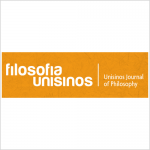Charles Taylor’s communitarian criticism of the liberal view of (negative) freedom
Vol 15, No 1 (2014) • Filosofia Unisinos - Unisinos Journal of Philosophy
Autor: Cesar Augusto Ramos
Resumo:
We intend to show that Taylor’s communitarian criticism of the liberal view of (negative) freedom proposes a new way of seeing the freedom of the will (which is called positive freedom). Theories of negative liberty simply rely on an opportunity-concept. This concept does not involve the capacity for realization, since it applies to (negative) freedom as the absence of obstacles, which becomes explicit as the power to do this or that without facing external, physical or legal impediments, for the exercise of this or that possible action. The issue becomes more complex with the exercise-concept, whereby freedom essentially entails self-determination and control over the person of the agent and their action and, therefore, has an intrinsic value of achievement and not simply an instrumental one. Without neglecting the importance of the liberal value of individual freedom, Taylor proposes a new way of seeing this freedom: it does not reside in the exercise of undifferentiated options, but in the actual exercise of capacities through the fulfilment of certain desires that are defined as authentic. We are free only if we do what we really want on the basis of our true desires, not compromised by internal obstacles, in particular by the non-authenticity of some of them.
ISSN: ISSN: 1984-8234
Texto Completo: http://revistas.unisinos.br/index.php/filosofia/article/view/fsu.2014.151.02
Palavras-Chave: freedom,communitarianism,liberalism

Filosofia Unisinos - Unisinos Journal of Philosophy
The journal Filosofia Unisinos - Unisinos Journal of Philosophy is published once every four months by Universidade do Vale do Rio dos Sinos.
Articles must be original, unpublished, and not under consideration for publication anywhere else and can be written in Portuguese, English or Spanish
Filosofia Unisinos - Unisinos Journal of Philosophy prints articles, translations and critical book reviews. It also reprints papers that are considered fundamental to the area when authorized written permission is given by the original publisher.
